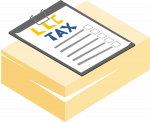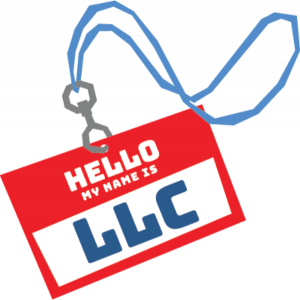Idaho LLC Taxes
Idaho LLCs are taxed as pass-through entities by default. This means that the LLC itself doesn’t pay taxes. Instead, its profits (or losses) pass through the LLC and onto the personal tax filings of the members (owners) of the LLC. Beyond the taxes members pay on their portion of the LLC’s profits, they’ll also be responsible for paying the combined Social Security (12.4%) and Medicare (2.9%) self-employment tax of 15.3%. They can also expect to pay Idaho’s graduated income tax (1% to 6%). Read on to get an insider’s view of the kind of taxes your LLC can expect to pay in Idaho.
In this article, we'll cover:


How are Idaho LLCs taxed?
A single-member LLC (SMLLC) is taxed as a sole proprietorship by default. A multi-member LLC is taxed as a partnership by default. To file federal taxes as either type of LLC, you need to file one of these forms:
- Single-member LLC—Form 1040 (usually Schedule C, but some SMLLCs file C-EZ, E, or F)
- Multi-member LLC—Form 1065
An Idaho LLC can also elect to be taxed as an S-corp or C-corp. Let’s explain what that means for your LLC taxes.
Idaho LLCs taxed as S-corp
Idaho LLCs have the option of electing to be taxed as S-corps. Like a regular LLC, the S-corp is taxed as pass-through entity, which means S-corps don’t have to pay the usual corporate income tax. However, unlike regular LLCs, S-corps reduce amount of self-employment tax (15.3%) owed by making distributions (payments) to their members. In order for your LLC to be taxed as an S-corp, you’ll file Form 2553 with the IRS.
However, before you get all excited about the tax savings of S-corp status, your LLC has to meet certain IRS requirements. You’ll also want to consult a tax professional to see if it makes sense for your LLC to choose S-corp status. S-corps report their income to the IRS by filing Form 1120-S. S-corp tax filings are a bit more complicated than regular LLC filings, but in some cases the tax savings may be worth the extra work.
LLCs taxed as C-corp
Your Idaho LLC can also elect to be taxed as a C-corp, which is the default tax status for corporations. While it’s not nearly as common as electing S-corp status, some LLC owners will find that they can benefit from being taxed as C-corps because they are eligible for more tax deductions than regular LLCs. C-corps are also more attractive to investors. C-corps will file Form 1120 with the IRS, and they’ll pay the 21% federal corporate income tax as well as Idaho’s 6% corporate income tax. Consult a tax professional before you even think about changing your LLC’s tax status.

Idaho State Income Tax
If you’re filing under either default LLC or S-corp status, you’ll pay individual income tax in Idaho which ranges from 1% to 6%. Here’s a look at individual income tax rates in Idaho:
| Taxable Income, Filing Separate | Taxable Income, Filing Jointly | Idaho Personal Income Tax Rate |
| Less than $1,588 | Less than $3,176 | 1% |
| $1,589 to $4,762 | $3,177 to $9,525 | 3% |
| $4,763 to $7,938 | $9,526 to $15,877 | 4.5% |
| $7,939 and up | $15,878 and up | 6% |
While you won’t pay taxes at the entity level when filing under default status, you’ll still need to file Form 40 to report your LLC’s income to the state. Also, if your LLC is taxed as a C-corp, you’ll need to pay the Idaho corporate income tax (Form 41), which is a flat 6% (down from 6.925% in 2020).

Sales and Use Tax
Idaho imposes a 6% sales and use tax on the sale of goods and services. Each municipality within Idaho can also levy a local sales and use tax. While these taxes are paid by the consumer, as an LLC, it will be your job to collect them and remit them to the state on a quarterly basis. In order for your LLC to legally collect taxes, you’ll need to register your business online with Idaho’s Department of Labor or print out a Idaho Business Registration Form (Form IBR-1) and mail it in to the address on the application.

Local Idaho Taxes
Local taxes will vary depending on where the LLC does business and what kind of business it is involved in. For example, cities like Boise, Idaho Falls, Pocatello and Chubbuck only levy a tax on lodging. All other sales are subject to the regular state sales tax of 6%. However, a city like Ketchum levies an additional 2% tax on all local purchases, and an extra3% tax on alcohol and short term rental properties. To make sure your LLC is meeting all of its local tax obligations, your best bet is to contact the tax authority in the jurisdiction where you do business.

Other Taxes in Idaho
Now that you’ve got a handle on federal, state, and local tax requirements, you’ll want to be aware of some other taxes that are imposed by the state of Idaho.
Idaho State Employer Taxes
If your LLC has employees, you’ll need to budget for unemployment insurance and workers’ compensation taxes:
- Unemployment Insurance (UI) Tax— As of 2022, Idaho’s unemployment insurance tax rates range from 0.207% to 5.4%. However, these rates can, and often do increase year after year. Rate increases generally depend on the size of Idaho’s employment security fund and local economic conditions.
- Workers’ Compensation— Workers’ compensation insurance covers medical expenses and replaces income for employees who are injured on the job. Idaho law states that workers’ compensation insurance is required for any business with at least one employee, though there are exemptions for some types of employment. Rates are based off the type of work the business is engaged in and how many employees are being insured.
To learn more about Idaho employer taxes, visit the Idaho Department of Labor website.
Industry Taxes
When it comes to taxes, there’s always more. Idaho’s Tax Commission has a list of industry-specific taxes your LLC will want to be aware of:
- Alcoholic Beverages Tax
- Amusement and Vending Machine Annual Decal Fee Tax
- Beer and Wine Taxes
- Cigarette/Tobacco Tax
- Controlled Substance Stamp Tax
- Farming and Ranching Tax
- Fiduciary Tax
- Fuels Taxes
- Mine License Tax
- Oil and Gas Production Tax
- Operating Property Tax
- Permanent Building Fund Tax
- Prepaid Wireless 911 Service Fee
- Travel and Convention Tax
- Vacation Rentals and Short-term Lodging Tax

Do foreign LLCs in Idaho need to pay Idaho taxes?
Yes, foreign LLCs are taxed just like domestic LLCs. A foreign LLC is an LLC that was formed outside of Idaho but does business in Idaho. This means that an Idaho foreign LLC will be expected to pay taxes on any income earned in Idaho. You’ll want to check with the local government office in the jurisdiction where your business operates to see if you need to register for sales and use tax or other local taxes.





